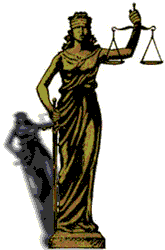 |
Is the legal method the story about how legal positions are determined or is it the story about how legal justifications are determined?? |
Are we, by any means, able to access and understand what influences judges? What determines what position a judge, and therefore every legal professional, will take in a given legal matter?
My approach is that the only thing we have access to is their rhetoric, meaning the text where they justify or rationalize their positions. The law is almost as pleasant to use, as if my big brother would say: 'Sorry little fellow, but father has decided so and so.'
I am writing a Norwegian doctorate thesis in law, where I try to follow the path of the legal rhetoric. In brief: My first point is that everyone doing legal reasoning: litigants, legislators, judges, administrators, legal theorists etc. are using arguments in order to persuade other members of the legal reasoning society. It is a matter of strategy, and the fundamental question then becomes, what kind of tools and means one uses in order to persuade about the correctness of ones legal conclusions.
I think that there are at least three levels of persuasion tools:
- The verbal expression
- The nonverbal expression
- The cultural context
On the first level, I intend to try use the classical rhetoric as a tool to interpretate what is making the persuasive power of legal reasoning. I am using Aristotle concept where you consider argumentation as a speech in order to persuade. My thesis is that there should be at least five things that are relevant for the rhetoric power.
- The reliability of the speaker (ethos); supreme court vs. Primary court; professors vs. students
- The content of your arguments (epistemology); law & facts
- The situation and the context of the speech (tempus)
- The form of the speech (modus) (legal prose ect)
- The audience (auditorium) Who is your adressee?
However, I consider the classical rhetoric as an analytic tool, mainly based upon verbal persuasion. I am going to use semiotics in interpretating the nonverbal rhetoric in jurisprudence. One example of a nonverbal and persuading rhetorical expression could be the architecture of the courtroom. At the time I am not quite sure if I could structure these rhetorical expressions as a speech-regime as above.
I also consider that the third level of persuasion is in the Western/European legal culture as so called doxas. I want to highlight on both premises and metaphors that maybe are considered to be universal. But if we take a closer look they seem to be quite specific for the Western/European culture. One example is the concept of the earth as an object, which implies the discussion of the ownership of the land. If the concept was that the earth is a subject - you couldn't discuss ownership. How can you own a subject? One example of a basic metaphor is the metaphor "argumentation is war", which is analyzed by Lakoff & Johnson in Metaphors we live by, Chigago 1980. In order to uncover those rhetorical aspects I want to use legal antrophology.
*****************| Even if my bibliography mainly have texts in Norwegian - You can browse through the bibliography. | |
|
I would love to get comments on such an approach. |

|

|

|

|
|

|

|
| Yoikroom | Galleries | Whats New | Sitemap | Contact | Ande | Index |